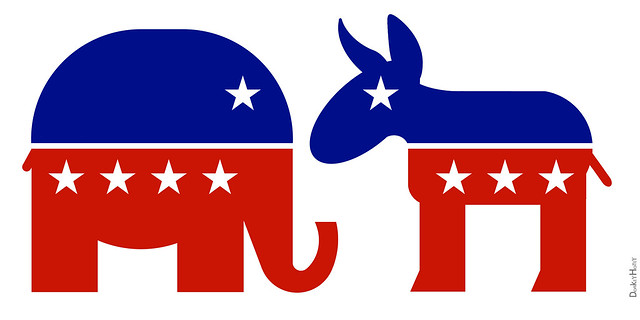
I may be wrong, but I believe that individuals reveal some of their most personal beliefs, traits and values when they open up to discuss why they have certain political affiliations and/or why, over the course of time, they change such affiliations and loyalties.
I did so about a decade ago when I wrote about why I left the Republican Party and became a Democrat.
Our David Robertson just shared with us why, after being a “nominal Republican,” he re-registered to vote as an Independent.
The reasons why people change their political affiliations are numerous and varied: sometimes simple, sometimes complex; sometimes obvious, sometimes subtle, but generally deeply personal and, I believe, after a lot of soul-searching.
At least in my case it took a lot of soul-heart-searching and many years to come to the conclusion that the Republican Party was not for me.
I was thus surprised when, eight years ago, then-Rep. Michele Bachmann (R-MN), revealed that she shed her youthful Democratic roots and became a Republican, after reading a “snotty novel,” critical of the Founding Fathers, by Gore Vidal. According to Bachman, she “put the book down and realized, ‘I think I must be a Republican. I don’t think I’m a Democrat.’”
It was that incident that prompted me a few years later to ask TMV readers, “Why Did You Switch to the Republican Party?”
There were more than 30 comments by readers. Some still follow TMV, some no longer so and, sadly, at least one – Ron Beasley — is no longer with us.
It is striking how much commonality there is in reasons given, first for belonging to a political party (whether Republican, Democrat, Libertarian, Independent) and then for switching or not switching parties in Robertson’s piece, in the comments following it and in the comments five years ago.
Environment, family, upbringing are mentioned frequently as reasons for a person’s first party affiliation — often a lifetime affiliation. “No Aha moments like Michelle and no horrendous incidents to turn me around,” one reader said.
As to why readers “evolved” or changed political parties, one sees: religious beliefs, or reaction against religious beliefs being imposed and, of course, pro- or con abortion, government health care, social programs, foreign entanglements and military intervention, climate change mitigation, immigration, minority rights, taxes, fiscal policies — nothing new here.
Interestingly, political pragmatism is given by several as a reason for “nominally” registering with or belonging to a particular party, not necessarily the preferred party.
Finally, some attribute their conversion to “R” or D” to increased education, awareness, observation, “seeing the light. “I moved from left to right because I studied, I observed, and I learned,” one reader “observed.”
Why and when did I “see the light”?
The old timers here have heard it more than enough.
For those who have not and are interested, here is a shortened version:
After describing how at a Christmas family gathering in 1968, when I was the only member of the military and the only Republican in our immediate family, our conversation eventually turned to the major topic in those days, the war in Vietnam, I continued:
“As a young Air Force captain, I ardently — almost fanatically — supported the war and those who were running the war. I blindly believed in the ‘Domino Theory.’ I was convinced that by fighting in that far-away country we were defending freedom and democracy over there and our own national security over here. I revered President Nixon and admired Henry Kissinger. Ronald Reagan would later become my idol, Ollie North my hero.”
The conversation soon turned emotional. I defended the war, the casualties and the alleged atrocities and offended my sisters to the point that I remember seeing tears in their and my mother’s eyes.
“Yes, I was a gung-ho Republican back in 1968,” I wrote and proceeded:
“I continued to be a flag-waving war supporter for several more months after that December morning, despite the horrendous human toll the war was taking on both sides. Eventually the horrors of that war and the words I had read by the Roman historian Tacitus, ‘They made a wasteland and called it peace,’ became too poignant for even me to ignore.
Although disillusioned with the war, I continued to be a halfhearted Republican for several more years, while still in the military and while working for a defense contractor. By the time I retired from my second career, however, I had fully flip-flopped.
My disillusionment with the Vietnam War was one reason for my conversion. I also gradually realized that ‘moral principles,’ ‘family and traditional values,’ and other ‘values’ that my previous party claimed to have exclusive rights on, were quite uniformly shared by all Americans, regardless of political affiliation — or were violated by Republicans and Democrats alike.
Perhaps it was because I saw that Democrats are just as God-fearing as Republicans are.
Perhaps it was because I came to the conclusion that ‘compassion,’ ‘tolerance,’ and ‘inclusion’ are a way of life with Democrats, not just hollow quadrennial campaign slogans.
There were other reasons for my ‘flip-flopping.’ But the most personal and compelling reason was that so many from my previous party allege that my son is immoral, a biological error, or worse. A person who does not deserve all the rights and privileges other Americans enjoy. You see, my son — the finest young man in the world — happens to be gay.
Finally, it could also have something to do with the tears in my sisters’ and mother’s eyes about 40 years ago”.
Lead image: Donkeyhotey.com
















